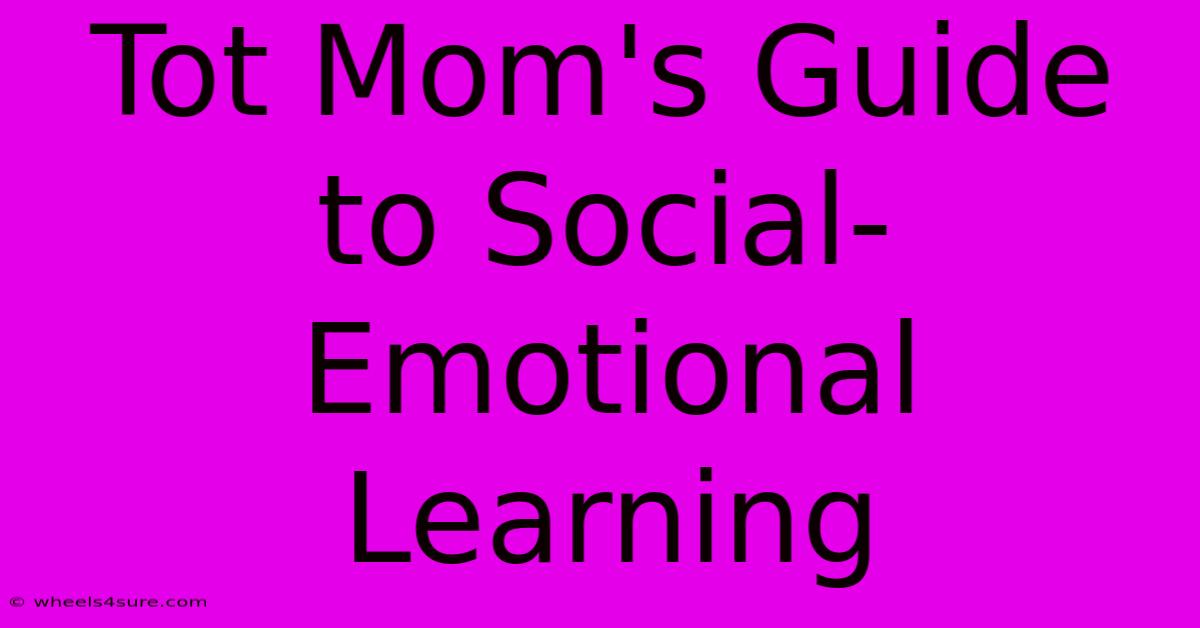Tot Mom's Guide To Social-Emotional Learning

Table of Contents
Tot Mom's Guide to Social-Emotional Learning (SEL)
Navigating the world of motherhood is a rollercoaster, and for toddler moms, the ride can feel particularly intense. Beyond the diaper changes and tantrums, there's a crucial element often overlooked: social-emotional learning (SEL). This guide provides practical tips and insights to help your little one flourish not just academically, but emotionally and socially as well.
Understanding Social-Emotional Learning (SEL) for Toddlers
SEL isn't about forcing your toddler to behave perfectly. Instead, it's about fostering their ability to understand and manage their emotions, build healthy relationships, and make responsible decisions. For toddlers, this translates to:
- Self-awareness: Recognizing their own feelings (happy, sad, angry) and expressing them appropriately.
- Self-regulation: Learning to manage their impulses and emotions, like calming down after a tantrum.
- Social awareness: Understanding the feelings and perspectives of others, developing empathy.
- Relationship skills: Building positive relationships with peers and adults, cooperating, and sharing.
- Responsible decision-making: Making choices that consider their own well-being and the well-being of others.
Practical Tips for Incorporating SEL into Your Daily Routine
Integrating SEL into your daily life doesn't require complex strategies; it's about building mindful moments into your routine.
1. Label Emotions: Name That Feeling!
Toddlers are still learning the vocabulary of emotions. When your toddler is upset, instead of simply saying "Stop crying," try saying, "You seem really frustrated because you can't build the tower." This helps them connect their feelings with words.
2. Model Healthy Emotional Expression: Show, Don't Just Tell
Children learn by observing. Show your toddler how you handle your own emotions. When you're feeling frustrated, say, "I'm feeling frustrated because this is taking longer than I expected. I'm going to take a few deep breaths to calm down."
3. Encourage Empathy: Walk in Their Shoes
Help your toddler understand other people's feelings. When you see a child crying in the park, gently ask, "Do you think that child is sad?" This promotes empathy and compassion.
4. Practice Problem-Solving Together: Teamwork Makes the Dream Work
Instead of immediately solving your toddler's problems, guide them to find solutions themselves. If there's a conflict over a toy, ask, "How can we share this toy so that both of you can play?"
5. Read Books About Emotions: Storytelling for Emotional Growth
Children's books are fantastic tools for teaching about emotions. Choose books that depict a range of emotions and offer strategies for coping with challenging feelings. Reading together creates a warm and engaging learning environment.
6. Celebrate Small Victories: Positive Reinforcement
Acknowledge and praise your toddler's efforts in managing their emotions. Even small steps, like taking a deep breath to calm down, deserve recognition and encouragement.
7. Set Clear Expectations: Boundaries and Consistency
Establish clear and consistent rules and expectations. Toddlers thrive on routine and predictability, helping them feel secure and safe. Explain the reasons behind the rules, creating an environment of understanding and cooperation.
8. Use Positive Discipline: Guidance, Not Punishment
Focus on guiding your toddler's behavior rather than resorting to punishment. When your toddler misbehaves, use this as a teachable moment to discuss their actions and the impact it had on others.
9. Seek Support When Needed: You're Not Alone
Motherhood can be challenging. Don't hesitate to reach out to other moms, family members, or professionals for support. Connecting with others provides valuable emotional support and practical advice.
The Long-Term Benefits of SEL for Your Toddler
Investing in your toddler's social-emotional development now pays dividends in the future. Children who develop strong SEL skills are more likely to:
- Have better academic performance.
- Form healthy relationships.
- Cope with stress and adversity effectively.
- Make responsible decisions.
- Be successful in life.
By incorporating these simple strategies into your daily routine, you’ll be equipping your toddler with the essential tools they need to navigate the world with confidence and resilience. Remember, it's a journey, not a race! Celebrate your progress and enjoy the special moments of growing together.

Thank you for visiting our website wich cover about Tot Mom's Guide To Social-Emotional Learning. We hope the information provided has been useful to you. Feel free to contact us if you have any questions or need further assistance. See you next time and dont miss to bookmark.
Featured Posts
-
Ius Ageless Look The Skincare Routine
Apr 14, 2025
-
Kaka Son The Truth About Kaka Son
Apr 14, 2025
-
Andrew Schulz From Zero To Multi Millionaire
Apr 14, 2025
-
Rich Dad Poor Dad Pdf Your Free Road Map To Wealth
Apr 14, 2025
-
Natasha Jonas Net Worth Bigger Than You Think
Apr 14, 2025
